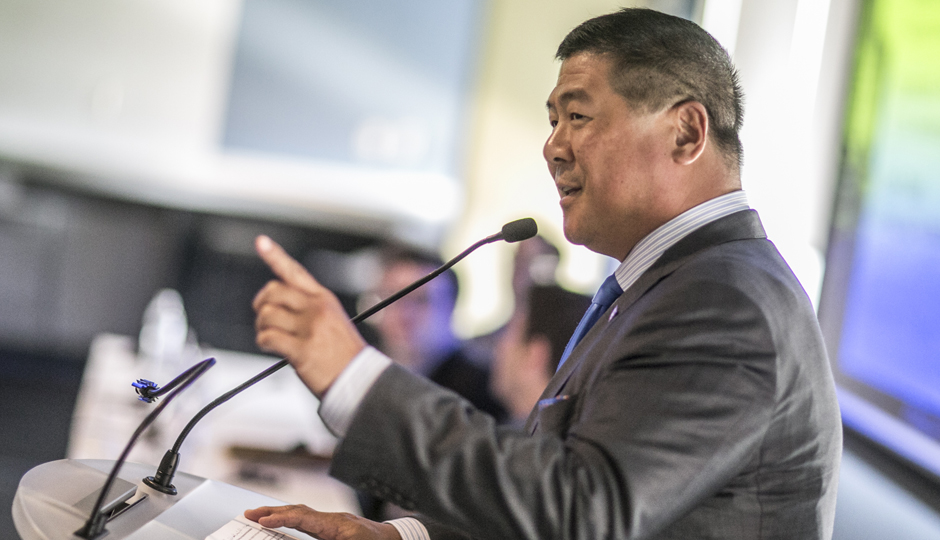Do I Start a Business or Get a Job? Sage Advice from Stephen Tang
Excited about Philly’s innovation boom over the last five or 10 years? Well the University City Science Center has been funding entrepreneurs and advancing innovation for 52 years.
Under the same roof on 37th and Market Streets, there are scientists working on treatments for Ebola, blood sensors to detect heart attacks and cancer, and beer tests to prevent spoilage. It’s a place where early-stage companies can get free space, free coffee, free wifi, and connect with other entrepreneurs and startups. It’s also happens to be the oldest and largest urban research park in the country.
I recently sat down with CEO Stephen Tang to discuss his thoughts on Philly’s emerging entrepreneurial scene, and how a stalwart like the Science Center fits into the new innovation boom. We also talked about Philly’s amazing pool of biopharma talent, lessons learned by young entrepreneurs, and why he isn’t crazy about the University City Science Center’s name.
BizPhilly: Here’s a question you probably get all the time: Should I get a job or take a chance being an entrepreneur? How do you typically respond?
Tang: I’m a little biased. It’s hard to be prescriptive with anybody’s situation. If you’re not yet married or committed and don’t have kids, you should take risks and learn as much as you can. Or try to find a job that lets you do as many things as possible. That’s why, even at the university level, they’ve fostered entrepreneurial programs of their own so that students can start businesses while they’re in college. A lot of things have conspired to make that possible, not the least of which is that you can design a cell phone app for tens of thousands of dollars, charge it to your credit card and within a couple weeks have it on the Apple Store. That’s making people think very differently about their career development.
I don’t think you’re wedded to one direction. You can be in a corporate environment, stay in touch with your buddies who are starting a new venture and pivot back in and pivot back out. That’s the way established innovation communities like Silicon Valley and Boston work. People migrate all the time.
There’s an underlying psychological and philosophical hurdle: We have to be comfortable with failure. In an established business culture, not having a job is a bad thing. In an entrepreneurial, innovative culture, when you don’t have a job, you can work on your business plan.
BizPhilly: Still, it must be tough to pay rent.
Tang: It is, but you can move back with mom and dad for a while. The fundamentals about making a living are still there. College is the best time to start a business because if you fail, nobody cares. You were there for a degree anyway.
BizPhilly: As the companies you fund grow, how do you encourage them to stay in Philadelphia?
Tang: It’s really an issue of finding a compelling reason why place matters. Either they have customers here, they have suppliers, or they have employees that don’t want to move from Philadelphia. Sometimes it doesn’t work out that way, but I would bet heavily on Philadelphia being able to do that. We have a vibrant “meds and eds” community. If you’re developing a digital health application and you need customers that are either patients, physicians, hospitals or payers, we have a very intricate network. If you want trial something at Jefferson, Temple, Penn, Drexel or Hahnemann, they’re all here.
BizPhilly: What do you want people to know about the Science Center that they may not already know?
Tang: It’s a little bit of a misnomer that the place defines us on the city map, because we’re actually a resource center for the entire region. We’ve been working hard to be an asset to the city, to the tri-state region, to the commonwealth of Pennsylvania, and nationally as well. I think we’re making very good inroads in that. I think what I’d like people to know is: What’s good for the science center is good for University City, is good for the city, the region, the state and the country in terms of advancing innovation and entrepreneurship.
BizPhilly: To the layman, the name “University City Science Center” seems confusing. Do you ever think of changing it?
Tang: We wrestle with that all the time. Should we change our name? How do we present ourselves in a way that’s more understandable. We’ve decided that we’d like to do it with our actions, not with a name change.
BizPhilly: Tell us about the scientific talent in the Philadelphia region. There’s quite a talent pool here, correct?
Tang: The talent in this region is incredible. If you just look at the life-science industry including pharma, I think you’re within 100 miles of 80 percent of the industry. As far as access, the science being done in University City alone is close to a billion dollars if you count everything Penn and Drexel do. If you expand it to New Jersey and Delaware, that’s a huge catchment area for the fuel that drives innovation.
BizPhilly: What are some surprising things you’ve learned about startups during your tenure?
Tang: It’s not always cheap space that startup companies are looking for. They want to be in a community. And it’s important to get them to stay in that community. Where do talented workers want to live? They want to live in the city. That live, work and play notion is something we’re trying to capitalize on. There has got to be a vibe that attracts them. If you look at Cambridge, Mass. or Mission Bay in San Francisco, they have that. It’s a dimension Philadelphia needs. It’s one of the main reasons we’re about to open 3601 market, the residential tower. We want to be a vibrant 24/7 community for innovation, not a concrete chasm that’s only open from 9 to 5.



